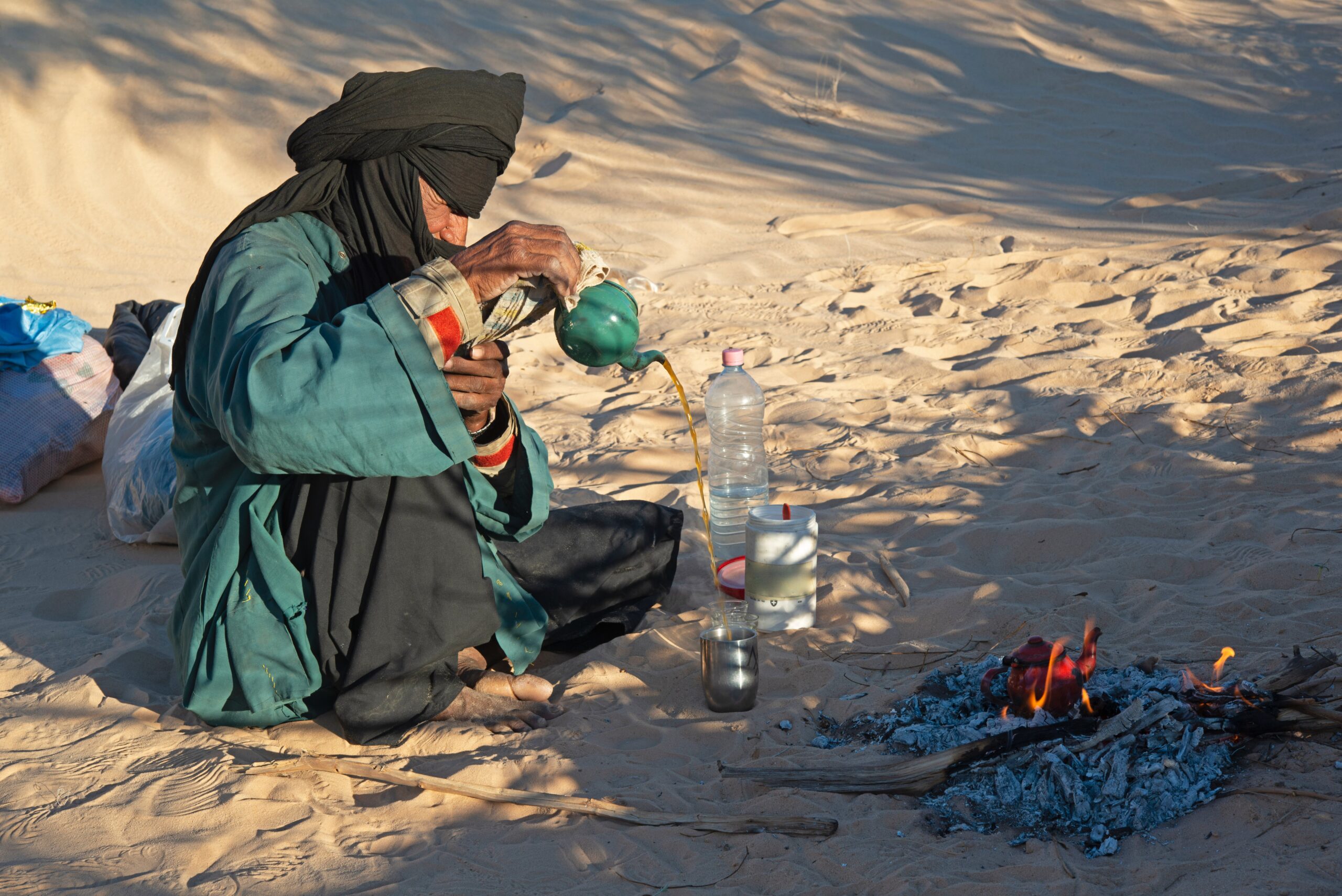Many kn ow the Tuareg as “the eternal wanderers.” What is the story behind this phraseology and the “Desert Blues,” known as Tuareg music?
The Tuareg people have a rich cultural heritage that spans over a thousand years. Living across the vast expanse of the Sahara desert, they are nomadic people who place a deep value on freedom and independence. Despite facing numerous external challenges, the Tuareg remain resilient and deeply connected to their land and traditions.
One of the most striking aspects of Tuareg culture is their unique music, known as Desert Blues. The genre has captivated audiences worldwide, introducing many to the mesmeric sounds of this music from the African desert. Tuareg music contains hypnotic rhythms and soulful vocals.
In this post, I will share the Tuareg people’s fascinating history and remarkable musical heritage. I also feature the 12 most popular Tuareg music artists who represent the spirit of this genre.
The Tuareg adopted a nomadic lifestyle over a thousand years ago. It involves constant movement in search of water and resources. This is why the Tuareg are called the “eternal wonderers.”
A wanderer roams the world searching for a place to call his own, a home, a country. But the home of the Tuareg people differs from traditional houses. They have no walls, roofs, doors, or windows. There are no fences or walls, nothing that limits or confines. Their home is the Sahara desert.
The Tuareg people live in various countries across the Sahara, including Mali, Algeria, Libya, Niger, Chad, and Nigeria. Their homeland is vast and barren, consisting of thousands of kilometers of burning sand and rocks. It is a difficult place to live, and the Tuareg must constantly move in search of water and resources.

The Tuareg have a rich cultural heritage with a deep appreciation for their traditions and cultural identity. Despite their nomadic lifestyle, the Tuareg have a strong sense of community and a deep bond to their families and land.
Climate change threatens the Tuareg way of life, with severe and constant droughts pushing them out of the Sahara. Because of this, they must travel to find water. All those regions are already occupied, however. The areas where the Sahara and the Sahel meet are where the Tuareg’s homeland ends and where the more settled societies begin. The competition for resources, different cultural values, and a subset of complex factors have led to several regional conflicts. This political instability has inspired many songs and Tuareg music bands such as Tinariwen.
The Tuareg continue to inspire people worldwide with their music, traditions, and unwavering spirit of independence. Their culture is rich and unique, shaped by their nomadic way of life and their deep connection to their land.
One key instrument in Desert Blues music is the traditional Tuareg drum, the tinde. This drum consists of a wooden frame covered with goatskin and a curved stick. The sound of the tinde is a crucial element of the music and adds a distinct and unmistakable flavor to the music.
The guitar is a relatively new addition to the Tuareg musical tradition introduced by the French colonialists in the early 20th century. Despite the novelty, the Tuareg people have embraced the instrument and have adapted it to their unique style of music. In addition to the tinde, Desert Blues music also features bluesy guitar riffs. The guitar is often played with a slide, creating a distinctive sound synonymous with the genre.
Over time, Desert Blues has evolved to include more contemporary elements, such as electric guitars and synthesizers. The Tuareg incorporated these modern instruments to create a fusion of traditional and contemporary sounds. The result is a dynamic and evolving genre of music that continues to captivate audiences worldwide.
“Desert Blues – Un voyage musical au coeur du Mali” is a fantastic documentary about Malian music. It takes the viewer on a journey to the heart of Mali and explores the rich musical heritage of the Tuareg and other peoples.
Through interviews with musicians and Tuareg leaders, the film offers a unique perspective on the cultural significance of Desert Blues. The movie also highlights its role in preserving the traditions of the Tuareg people.
Along the way, the film explores the challenges faced by the Tuareg people. These challenges include political instability, armed conflict, and economic marginalization. The film furthermore highlights their unwavering spirit of independence and resilience. This is a powerful tribute to the Tuareg people and their remarkable musical heritage.

The Festival au Désert, or Festival in the Desert, is an annual music festival in Mali that showcases the music and culture of the Tuareg people. The festival started in 2001 and quickly gained popularity among music lovers worldwide.
Festival au Désert takes place in Essakane, a remote area of the Sahara desert about 65 kilometers from Timbuktu. The festival attracts musicians and visitors worldwide who want to experience the unique sound of Desert Blues and other genres of Tuareg music.
In essence, the festival is a celebration of Tuareg culture and heritage. It allows the Tuareg people to share their music, traditions, and way of life with the world. It also promotes cultural exchange and understanding as people from different countries and backgrounds come together to celebrate music and culture.
In the 21st century, Tuareg music reached a diverse group of people in and outside the Sahara. Groups like Bombino, Mdou Moctar, Tinariwen, and Les Filles de Illighadad have taken the mesmerizing and repetitive parts of the region’s folk music and put them into full-band Rock and roll. Altogether, the desert blues has reached a global audience that has never been seen before.
The 1960 Folkways album Tuareg Music of the Southern Sahara traces the origins of these sounds and styles, focusing on the ecstatic vocalizations and singing accompanied by few instruments. These raw, improvised recordings show the music that many tribes and communities have played in the Sahel for hundreds of years.
This reissue is part of the Smithsonian Folkways Vinyl Reissue Series, which brings hidden gems from the label’s massive collection to light and re-releases some of the label’s most famous and essential albums.
Below are the Top 12 Tuareg music artists representing the “desert blues” spirit – a type of music from the Sahara region of northern and western Africa.
Tinariwen is a musical group with a rich history dating back to the 1980s. Their name translates to “deserts” in the Tamasheq language, reflecting their connection to their land and nomadic way of life.
Over the years, Tinariwen has released several albums, including “Amassakoul,” “Aman Iman,” and “Tassili,” which have cemented their reputation as one of the essential bands in the Tuareg music scene. The band’s music also gained international recognition and has been featured in film soundtracks and popular TV shows.
The band’s fifth album, Tassili, was released in 2011 and won the Best World Music Album at the 54th Grammy Awards. Additionally, they were also nominated for Grammy awards three times.
Bombino (Goumar Almoctar’s nickname) is a Tuareg musician from Niger who has gained international recognition for his unique and soulful sound. Bombino’s music is deeply rooted in the nomadic way of life of the Tuareg people, reflecting their deep connection to their land and their traditions. His music is part of the Desert Blues genre, which features hypnotic rhythms and soulful vocals that often address political concerns and struggles faced by the Tuareg people.
Born in 1980 in Tidene, Bombino grew up in a Tuareg community in Niger. He started playing the guitar at a young age. By his teens, he was already performing at local festivals and events. He spent several years living in exile in Algeria and Burkina Faso, where he continued to play music and develop his unique sound.
In 2011, Bombino released his debut album, Agadez, which Dan Auerbach of The Black Keys produced. The album received critical acclaim and introduced Bombino’s music to a global audience. Since then, Bombino has released several more albums, including Nomad and Deran, which further cemented his reputation as one of the most influential musicians in the Tuareg music scene.
Afous D’Afous has gained recognition in recent years for its unique and soulful sound as a part of the Desert Blues genre. This Tuareg music group has been making waves in the Tuareg music scene for its distinctive sound and powerful lyrics. The group’s name, which means “hand in hand” in the Tamasheq language, reflects their message of unity and desire for peace and understanding between different cultures.
Kader Tarhanine, the group’s leader, received positive feedback in 2010 for his track “Tarhanine Tegla” (My Love is Gone). A way that later contributed to his well-known name, Kader Tarhanine. He formed Afous D’Afous in 2015, and the group released its debut album, “Tenere,” after that. The album became an anthem in the Tuareg community and the community’s favorite across multiple media platforms. This band remains one of the foremost leaders of the Tuareg music culture.
Their music often addresses the political concerns and struggles faced by the Tuareg people, including issues of displacement, marginalization, and the longing for freedom. Through their music, Afous DAfous represents the nomadic way of life of the Tuareg people and their deep appreciation for freedom and independence.
Alhousseini Anivolla is a renowned Tuareg guitarist and musician born in Niger in 1973. He grew up as a nomad, tending to animals and living on the land. As a musician, Anivolla has been heavily influenced by the success of Tuareg music groups such as Tinariwen and Terakaft. He is also the former guitarist and lead vocalist of Etran Finatawa, another popular Tuareg band.
Anivolla’s debut album, “The Walking Man,” showcases his unique guitar-playing style similar to the human type of the Tuaregs in Libya in 1970. The album features songs conveying Anivolla’s deep appreciation for his cultural heritage and nomadic way of life. His music is a powerful reflection of Tuareg culture, capturing the essence of their culture and inspiring audiences around the world.
Etran Finatawa is a group that has significantly impacted the Tuareg music scene with its unique sound and message. The group is based in Niger and debuted in 2004 during the Festival au Desert in Mali. This annual music festival showcases the music and culture of the Tuareg people. Etran Finatawa translates to “stars of tradition,” Their music is a fusion of the Tuareg and Wodaabe cultures to unite the two groups through music as a symbol of peace.
Etran Finatawa’s music reflects the rich cultural heritage of the Tuareg people and continues to inspire and captivate audiences globally. Their debut album, Introducing, was nominated for a BBC Radio Award for World Music in 2007. The group has toured extensively, performing in Europe, Canada, the United States, and Australia. Their unique sound and message have captivated audiences worldwide, making them a critical Tuareg music and culture symbol.
Kel Assouf is a musical group that has significantly impacted the Tuareg music scene with its unique sound and message. The group is based in Niger and is known for creating a fusion of different musical genres, including rock, reggae, salsa, and Afrobeat. Anana Harouna, the lead singer and guitarist of the group, is credited with forming the group and has been instrumental in crafting its unique sound.
The name Kel Assouf translates to “son of the desert,” “son of the infinite,” and “son of solitude,” which reflects the deep connection that the Tuareg people have with their land and their nomadic way of life. The Tuareg music culture is known for using the guitar instrument, which they have used to speak for their beliefs.
Their debut album, “Tin Hinana,” is named after an ancient Tuareg Queen and was released to critical acclaim. Through their music, Kel Assouf represents the spirit and struggles of the Tuareg people, reflecting their deep connection to their land and their traditions.
Tamikrest is a Tuareg music group that has gained worldwide recognition for its unique sound and message. The group is based in Kidal, Mali, and was formed in 2006 by Ousmane Ag Mossa. The group members come from different places, including Mali, Niger, Algeria, Belgium, and France, allowing them to incorporate various musical influences into their music.
Tamikrest’s music is a fusion of traditional Tuareg and Western rock and pop, creating a hypnotic and soulful sound that has captivated audiences worldwide. Their lyrics convey a message of hope, peace, and unity, reflecting the group’s desire to promote cultural exchange and understanding.
The group has gained international recognition and has performed at festivals and concerts worldwide, including the Festival au Désert in Mali, the Festival of the Desert in Timbuktu, and the WOMAD Festival in the UK. Tamikrest’s music has been featured in film soundtracks and popular TV shows, and they have released several albums, such as “Chatma,” “Kidal,” and “Taksera.”
Tartit is a Tamasheq-speaking band hailing from the Tombouctou region of Mali. Founded in 1992 in a refugee camp in the Saharan desert in Burkina Faso, the band’s name, Tartit, means “union” in the Tamasheq language, which reflects the group’s message of unity and the spirit of the Tuareg people. Tartit has male and female members, and its music has gained recognition for its unique sound and message.
The group had the invitation to perform in Africa and Europe. They performed at the MASA Trade Fair for African Arts in Côte d’Ivoire, the Festival of Women’s Voices in Belgium, the WOMAD Festival in Seattle, the Festival in the Desert in Mali, and toured many other places worldwide. In 1997, they released their first album, Amazagh, which didn’t acquire much fame. Still, their second album, Ichchila (2000), gained more popularity. Their song lyrics convey a message of hope, peace, and development of their homeland. The United Nations (UN) even recognized their exploits.
Terakaft is a highly celebrated Tuareg rock band established in 2001 by Sanou Ag Ahmed. The band’s name, which translates to “caravan” in the Tamasheq language, reflects their deep connection to their life. The group hails from Kidal, a remote Mali region; their music is a fusion of traditional Tuareg and Western rock. Terakaft’s sound is characterized by using two rhythmic guitars, one keeping the beat effortlessly while the other soars and is sweet, in addition to the deep tones of the bass.
Terakaft’s music combines the traditional rhythms of the Tuareg people with the energy and intensity of Western rock, creating a mesmerizing and hypnotic sound that is unique to the band. They continue to push the boundaries of the Desert Blues genre, incorporating new sounds and influences into their music while staying true to their Tuareg roots.
The Terakaft have performed in various concerts, including; The Festival with the Desert of Essakan and the Festival of the Camel of Tessalit. Their debut album, recorded in Bogolan Studios, is titled “Bismill,” Bko sessions.
Toumast is a well-known Tuareg music band that originated around 1990 with founding members Moussa Ag Keyna and Aminatou Goumar. French producer Dan Levy later joined the band. The band’s name, Toumast, means “identity” and reflects the deep connection of the Tuareg people to their culture and traditions.
Over the years, Toumast has released two albums, Ishoumar and Amachal, and has been featured in the film “Toumast the Film: Guitar and Kalashnikov.” Their music is a fusion of traditional Tuareg music and Western influences, creating a mesmerizing and hypnotic sound unique to the band. Through their music, Toumast represents the spirit and struggles of the Tuareg people, reflecting their deep connection to their land and their traditions.
Faris is a highly acclaimed multi-instrumentalist, guitarist, and singer-songwriter who has significantly impacted Tuareg’s music. Born and raised abroad, Faris was exposed to various musical genres. His maternal ties to the Tuareg people and their traditional music profoundly impacted him.
Faris’s unique sound blends traditional Tuareg music with Western rock and pop, creating a mesmerizing and hypnotic sound. His music often addresses themes such as resistance, unity, and social change, reflecting the challenges and triumphs of the Tuareg people. His debut album, “Mississippi to Sahara,” showcases his talent.
Imarhan is a Tuareg rock band that has become prominent in the Tuareg music scene. The band was started in 2006 with its base in Tamanrasset, Algeria. The group comprises five members: Sadam (Iyad Moussa Ben Abderahmane), Tahar Khaldi, Hicham Bouhasse, Abdelkader Ourzig, and Haiballah Akhamouk.
Imarhan’s music is a unique blend of traditional Tuareg music and Western rock, creating a mesmerizing and hypnotic sound that reflects the rich cultural heritage of the Tuareg people. The band’s sound is characterized by using two rhythmic guitars, one keeping the beat effortlessly while the other soars and is sweet, in addition to the deep tones of the bass. Their unique and powerful sound in their Aboogi album makes them one of the most influential bands to emerge from the Sahara region of northern and western Africa.
The Tuareg music culture, the desert blues, is a musically distinct genre from Africa. The genre encompasses the dessert struggles, rebellion, and criticisms of the government by the Tuareg people. The above artists have engraved the struggles experienced in their childhood and the hardships of their community into their music. The Tuareg music is unique and is taking over the world by storm.
If you’re a music lover and “crave” to learn more, sign up for the above newsletter to get a hand-picked selection of stories from books, music, and movie tips from countries worldwide!

